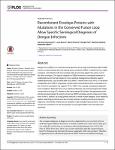Recombinant Envelope-Proteins with Mutations in the Conserved Fusion Loop Allow Specific Serological Diagnosis of Dengue-Infections
Rockstroh, Alexandra
Barzon, Luisa
Pacenti, Monia
Palù, Giorgio
Niedrig, Matthias
Ulbert, Sebastian
Dengue virus (DENV) is a mosquito-borne flavivirus and a major international public health concern in many tropical and sub-tropical areas worldwide. DENV is divided into four major serotypes, and infection with one serotype leads to immunity against the same, but not the other serotypes. The specific diagnosis of DENV-infections via antibody-detection is problematic due to the high degree of cross-reactivity displayed by antibodies against related flaviviruses, such as West Nile virus (WNV), Yellow Fever virus (YFV) or Tick-borne encephalitis virus (TBEV). Especially in areas where several flaviviruses co-circulate or in the context of vaccination e.g. against YFV or TBEV, this severely complicates diagnosis and surveillance. Most flavivirus cross-reactive antibodies are produced against the highly conserved fusion loop (FL) domain in the viral envelope (E) protein. We generated insect-cell derived recombinant E-proteins of the four DENV-serotypes which contain point mutations in the FL domain. By using specific mixtures of these mutant antigens, cross-reactivity against heterologous flaviviruses was strongly reduced, enabling sensitive and specific diagnosis of the DENV-infected serum samples in IgG and IgM-measurements. These results have indications for the development of serological DENV-tests with improved specificity.
No license information
Related Items
Show related Items with similar Title, Author, Creator or Subject.
-
2012-12-21ZeitschriftenartikelProtein-Protein Interaction Domains of Bacillus subtilis DivIVA Baarle, Suey van; Celik, Ilkay Nazli; Kaval, Karan Gautam; Bramkamp, Marc; Hamoen, Leendert W.; Halbedel, SvenDivIVA proteins are curvature-sensitive membrane binding proteins that recruit other proteins to the poles and the division septum. They consist of a conserved N-terminal lipid binding domain fused to a less conserved ...
-
2013-03-11ZeitschriftenartikelTowards further reduction and replacement of animal bioassays in prion research by cell and protein misfolding cyclic amplification assays Boerner, Susann; Wagenführ, Katja; Daus, Martin L.; Thomzig, Achim; Beekes, MichaelLaboratory animals have long since been used extensively in bioassays for prions in order to quantify, usually in terms of median infective doses [ID50], how infectious these pathogens are in vivo. The identification of ...
-
2013-08-08ZeitschriftenartikelCytomegalovirus Downregulates IRE1 to Repress the Unfolded Protein Response Stahl, Sebastian; Burkhart, Julia M.; Hinte, Florian; Tirosh, Boaz; Mohr, Hermine; Zahedi, René P.; Sickmann, Albert; Ruzsics, Zsolt; Budt, Matthias; Brune, WolframDuring viral infection, a massive demand for viral glycoproteins can overwhelm the capacity of the protein folding and quality control machinery, leading to an accumulation of unfolded proteins in the endoplasmic reticulum ...

